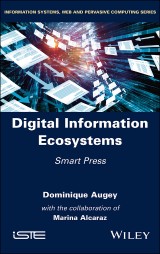Details

Digital Information Ecosystems
Smart Press1. Aufl.
|
139,99 € |
|
| Verlag: | Wiley |
| Format: | |
| Veröffentl.: | 23.01.2019 |
| ISBN/EAN: | 9781119579731 |
| Sprache: | englisch |
| Anzahl Seiten: | 238 |
DRM-geschütztes eBook, Sie benötigen z.B. Adobe Digital Editions und eine Adobe ID zum Lesen.
Beschreibungen
<p>Digital information, particularly for online newsgathering and reporting, is an industry fraught with uncertainty and rapid innovation. Digital Information Ecosystems: Smart Press crosses academic knowledge with research by media groups to understand this evolution and analyze the future of the sector, including the imminent employment of bots and artificial intelligence.<br /> <br /> The book adopts an original and multidisciplinary approach to this topic: combining the science of media economics with the experience of a practicing journalist of a major daily newspaper. The result is an essential guide to the opportunities of the media to respond to a changing global digital landscape.<br /> <br /> Independent news reporting is vital in the contemporary democracy; the media must itself become a new “smart press”. </p>
<p>Foreword ix</p> <p>Introduction xv</p> <p><b>Chapter 1. How Do the Economy and the Press Influence Each Other? 1</b></p> <p>1.1. The concept of media 1</p> <p>1.2. The concept of information 3</p> <p>1.3. The economy 7</p> <p>1.4. A brief history of the media and press economy 7</p> <p>1.4.1. The discreet beginnings of the media economy 8</p> <p>1.4.2. The renewal of the media economy since the 2000s 10</p> <p>1.5. The two “meanings” of media economics 17</p> <p>1.5.1. Does media have an influence on the economy? 17</p> <p>1.5.2. Does the economy influence the media sector? 25</p> <p>1.6. Summary 32</p> <p><b>Chapter 2. Can We Trust the Press? 35</b></p> <p>2.1. The credibility of media and journalists 35</p> <p>2.1.1. Distrust of the Internet is growing 36</p> <p>2.1.2. But criticism of journalists remains strong 37</p> <p>2.2. Is there an informational or ideological bias in the press? 38</p> <p>2.2.1. The measurement of an informational bias 38</p> <p>2.2.2. Tests on U.S. media 44</p> <p>2.2.3. The case of the Asian and European press 47</p> <p>2.2.4. The impact of newspaper owners 48</p> <p>2.2.5. Pluralism and competition 50</p> <p>2.3. Summary of challenges 54</p> <p><b>Chapter 3. What are the Links between the Press and Politics? 55</b></p> <p>3.1. A diminishing influence 58</p> <p>3.2. The notion of collusion between the media and politicians 60</p> <p>3.3. Do newspapers run elections? 62</p> <p>3.4. The importance of press freedom 64</p> <p>3.5. Differences between local and national press 67</p> <p>3.5.1. The local press is more influential 67</p> <p>3.5.2. The Internet confirms this influence 68</p> <p>3.5.3. The case of Japan 68</p> <p><b>Chapter 4. Does the Press Need Advertisers? 71</b></p> <p>4.1. Advertising-free newspapers? 73</p> <p>4.2. Pressure from advertisers and readers 74</p> <p>4.2.1. When advertisers apply the pressure 74</p> <p>4.2.2. When readers put pressure on advertising 76</p> <p>4.3. Can media say everything? 77</p> <p>4.3.1. Seducing advertisers 77</p> <p>4.3.2. Can media oppose an advertiser? 81</p> <p>4.3.3. The impact of taxation 84</p> <p><b>Chapter 5. Is the Printed Newspaper Gamble Crazy? 87</b></p> <p>5.1. Is it the end of printed papers in the United States? 88</p> <p>5.1.1. Preparing for a change of era? 89</p> <p>5.1.2. Digital reading exceeds paper reading 91</p> <p>5.1.3. Difficult print launches 93</p> <p>5.2. Among pure players: the free model is crumbling 95</p> <p>5.3. The online press mainly chooses the paid model 97</p> <p>5.4. Managing the model change 99</p> <p>5.4.1. Absorbing the negative effects of the Web on print 100</p> <p>5.4.2. The copy/paste temptation 101</p> <p>5.5. The press in start-up mode 104</p> <p>5.5.1. Is the future in code? 104</p> <p>5.5.2. The hope of finding new resources 106</p> <p>5.6. Understanding the algorithmic agenda 109</p> <p><b>Chapter 6. Are There Dangerous Links between Media and Social Networks? 115</b></p> <p>6.1 The indispensable social networks. 115</p> <p>6.1.1. Strategies to take advantage of social networks 117</p> <p>6.1.2. Media at the mercy of networks 118</p> <p>6.1.3. The media brand is fading away behind the social network brand 119</p> <p>6.1.4. The problem of revenue sharing between media and social networks 120</p> <p>6.2. The social network eco-system 122</p> <p>6.2.1. The influence of social networks 122</p> <p>6.2.2. The way in which we inform ourselves is not unbiased 125</p> <p>6.2.3. The influence of social networks on decisions 128</p> <p>6.3. Social networks are transforming the information business 131</p> <p>6.3.1. Journalists in networks 131</p> <p>6.3.2. The role of social network algorithms 133</p> <p>6.3.3. The impact of social network development on the quality of information 136</p> <p><b>Chapter 7. Will Fake News Kill Information? 139</b></p> <p>7.1. From media and network initiatives to a law 141</p> <p>7.2. Fake news and post truth 143</p> <p>7.2.1. Misinformation circulates very quickly 145</p> <p>7.2.2. Fake news and social networks 146</p> <p>7.3. Why fake news? 149</p> <p>7.3.1. The impact of fake news and rumors 150</p> <p>7.3.2. Fact checking versus fake news 152</p> <p>7.3.3. Bad news 153</p> <p>7.3.4. Fake news and economic expectations 154</p> <p><b>Chapter 8. Are Robots and AI the Future of the Media? 161</b></p> <p>8.1. Robot journalists are already in action 162</p> <p>8.2. What is artificial intelligence? 164</p> <p>8.3. Research on automatic journalism 165</p> <p>8.3.1. From quantitative journalism to robot journalism 166</p> <p>8.3.2. Do readers and advertisers enjoy articles that have been written automatically? 168</p> <p>8.3.3. The impact of robotization 168</p> <p>8.3.4. What do human journalists think about it? 169</p> <p>8.4. How do these editorial algorithms work? 174</p> <p>References 179</p> <p>Index 205</p>
<p><b>Dominique Augey</b> is a senior researcher at Aix Marseille School of Economics (AMSE) and associate researcher at the media law and social change laboratory (LID2MS). She is Professor at Aix Marseille University (AMU), France, and director of a professional Master of Journalism and Communication within the prestigious Aix-en-Provence School of Law.</p> <p>With the collaboration of:<br /><b>Marina Alcaraz</b> is a journalist for Les Échos, a major French financial daily newspaper. After several years spent analyzing financial markets, she covers media strategy, evolution of the media and changes related to technologies and social networks. She is also the author of a book on editorial techniques.</p>

















